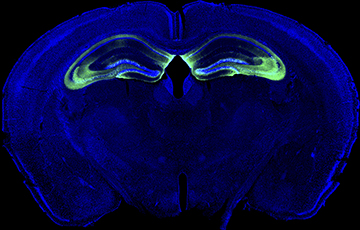
Vertical view of a mouse brain showing expression of light-sensitive protein in the hippocampus (green). Credit: Courtesy of P. Mendez / University of Geneva
Researchers led by Dominique Muller and Pablo Mendez at the University of Geneva, Switzerland, have used optogenentics and a mouse model to investigate the mechanisms that control neuron recruitment during memory formation (Neuron, doi: 10.1016/j.neuron.2016.01.024).
Memories are thought to leave a pattern or trace in our brain called an engram—a network of neurons located in the hippocampus. In order for a memory to “stick,” the engram needs to recruit the right kind and right number of neurons. To investigate how neuronal activity affects engram formation, the researchers created a strain of mice that had been genetically modified to express a light-sensitive protein in the cells within their hippocampi. The modification allowed them to activate the neurons optically using a fiber optic cannula in the hippocampus while the mice were involved in spatial exploration (SE) of a new environment or during a memory-making exercise.
During the SE exercise, they observed that the optogenetically activated neurons in the mouse hippocampus added to the active neuronal network and also inhibited the activation of neighboring neurons outside the network. During the memory-making exercise, the researchers were able to create an artificial memory by optically activating granule cells in the mouse hippocampus. Based on these results, the researchers deduced that neurons in the engram are able to control the size of the network by recruiting cells to the engram and muting neighboring cells outside the engram.
In subsequent studies, Mendez and his colleagues used optogenetic activation to force engrams to recruit more or fewer neurons to see how changing the network size would influence the memory. What they found was that the after a certain point, adding extra neurons to the engram had a detrimental effect on memory stability.
Christian Lüscher, an author on the paper said in a press release: “Now that we know the basic mechanism [for making memories], we want to decipher how memory itself functions. We still have many discoveries to make in order to understand in detail how our brain preserves our memories.”
